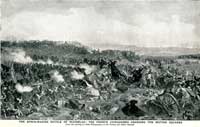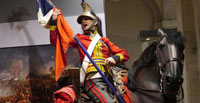
SCRAPBOOK |
||
An Oldhamer at Waterloo gives a first-hand report of the battle that ended the Napoleonic Wars.
|
||
|
There must have been Oldhamers in the thick of it at the Battle of Waterloo but who were they and where are the records? I decided to start with the original diaries of William Rowbottom, which are in safe-keeping at Oldham Local Studies and Archives, to see what clues he might give. William was a weaver who lived near Burnley Lane. He kept his diary from 1787 to 1830 chronicling local happenings, people and national events and I hoped that he might give the names of some Oldhamers who had been involved in this momentous event. However, there was only one entry that mentioned the battle. On 28th June 1815 he wrote:
Almost 70 years later in the 1880s, in the Oldham Standard, which was serialising the diaries, local historian Samuel Andrew added:
He continues with a memory of a hair-raising story told by a veteran of the battle:
There must have been many tales of this nature told over a pint or two locally, some true, others flights of fancy, but nowhere, apart from the diary entry mentioned above, are there any names mentioned in records that have survived in the public domain. It is fairly certain that between 30 and 40 local men were there on the fields outside Brussels for the final battle but who were they? Research using records that are now on-line has led to the discovery of the names of some of these soldiers. Abraham Brierley, Thomas Gibson, Dennis Barrot, John Lord, Joseph Lord and Thomas Mills are among those who were definitely there. The discharge papers exist for some of the men and from these we find that Dennis Barrot, Thomas Gibson and Joseph Lord served in the Life Guards and Thomas Mills was in the 23rd Regiment of Foot. Their records describe the appearance and height of the men. Life in Oldham may have been hard but the young men were well-nourished and strong as the three who were in the Life Guards were all about 6 feet tall and Thomas Mills, the Foot soldier, was slightly shorter. Unsurprisingly they had all been weavers in civilian life with the exception of Thomas Mills who had been a labourer. Joseph Lord had enlisted in Bolton at the end of 1807, when he was 22. The weaving trade was in a bad way according to William Rowbottom, who wrote that:
Joseph had married in 1805 and had a wife and baby son to support so, along with many others, he looked for other means of earning a living. The Army offered regular pay and perhaps the young men only thought of the adventure and did not realize what being a soldier really meant. The recruiting sergeants were very convincing in their tales of Army life. Joseph saw service in the Peninsular Campaign and took part in the Battle of Vitoria, which was viewed across Europe as the turning point in the long drawn-out war against Napoleon and the French as is indicated by the fact that even Beethoven was moved to write an orchestral tribute, Wellington's Victory, or, the Battle of Vitoria. By the time of the Battle of Waterloo in 1815 Joseph and the other Oldhamers were hardened soldiers and had been involved in many a bloody, life-threatening exchange at close quarters with the enemy. Searching the collections at Oldham Local Studies I found an item in the Oldham Chronicle on March 6th 1915 headed Oldham Soldier’s Account of Waterloo. The article mentions descendants of Joseph Lord who were living in Oldham and reproduces their ancestor’s letter, which had been mentioned in William Rowbottom’s diary 100 years before and had been kept safely for a century by the family. I also found that there are photocopies of Joseph’s letters home, and a poem he wrote after the battle, in the Archives here in Oldham. These had been presented to Councillor Jack Armitage, former Mayor of Oldham, in 1976 by a descendant of Joseph, Miss Dorothy Lord, of Strathfield, NSW, Australia. So, a copy of the letter that was mentioned in a diary in 1815 and had been treasured over the following years by the soldier’s family still exists for us to read in the present day. The letters are full of details of the experiences of one Oldhamer as he took part in the last battle of a long campaign. Joseph was slightly wounded in the battle and was recuperating in Brussels when he wrote the letter to his wife and another, to his mother, telling of the death of his brother, John, in the battle. To his wife he wrote:
He gives a detailed account of numbers in each company, his unit, the 2nd Life Guards, part of the elite Household Brigade, comprised about 240 men. He estimated that the British cavalry numbered 9,400. There was a skirmish between the British infantry and the French on the 16th June but nothing more until the afternoon of the 17th when the Life Guards, along with other troops, were attacked by the French coming out of wood to surprise them. Joseph writes vividly about the fierce fighting and retreat over the next few hours in terrible weather:
We can only imagine what Ann Lord was thinking as she read her husband’s letter. She would have been relieved that he had survived yet another battle but what fighting had he been involved in and what scenes had he witnessed on the day of the famous battle itself? Joseph recounts that the weather cleared up and, just before dawn, as the French were not stirring, wood was gathered to make fires in an attempt to dry their clothes as they were all soaked to the skin. At daybreak beer and food was found (perhaps commandeered from local houses?) and by 10 o’clock the British troops were refreshed, mounted and regrouped on better ground to await the next phase of the battle. It wasn’t long before action began. Joseph continues his letter:
This was just the beginning of the battle, which continued at a furious pace throughout the day, with no let-up in the fighting
Joseph tells the family that he had been able to speak to his brother John during a lull in the battle. They had been near one another all day and had, every now and then, checked that they were both still alive as men were falling all around them. About half past four they were all in a valley where the shot was mostly whistling over their heads and he had an opportunity to speak to John. They had both been through harrowing experiences throughout the day not knowing if each minute was to be their last. They spoke about their chances of survival and what messages to convey to the family if either died. Joseph continues, movingly, that:
The letter continues with a report on those other Oldhamers who were serving with Joseph. He writes:
The men from Oldham who survived the battle continued in the Army for varying lengths of time. Most left because of injury or illness and but Joseph Lord saw out his contracted time. Thomas Gibson was discharged in November 1816 his papers stating “that in consequence of a wound in the side received at the Battle of Waterloo, having disabled him from attending to his duty”. Thomas Mills lasted until May 1817 when he was discharged, aged 38, “as a consequence of being old and worn and having a gun shot wound in the left breast at Albeura 1811 and wounded left groin at Badajos 1812.” Dennis Barret was discharged in May 1825 when the reason given was “Abcess in the lungs - Consumption occasioned by wound at Waterloo”. Life for the ordinary soldier was hard and brutal as seen from Thomas Mills’ experience of being wounded twice during the Peninsular War but still fighting at Waterloo three years later and then being considered old and worn-out at the age of 38. Joseph Lord continued his career in the 2nd Life Guards for a further fifteen years until his discharge, in 1830, after 22 years service. Filling in the details of where he served and finding out if he saw any more active service involves more research in sources not available in Oldham. There is a Household Cavalry Archive at Windsor Barracks; perhaps that is where the rest of Joseph’s story will be found. I was intrigued by the story related in the 1915 Chronicle article that Joseph Lord had been a servant of Lord Castlreagh and had posed for one of the figures on Castlreagh’s monument in St. Paul’s Cathedral. The story handed down in the family was that Joseph had stood motionless for nine hours while his figure was moulded in clay. I attempted to find a suitable statue put nothing fitting the description was found. Yet another line of enquiry to be followed up. Filling in all the details leading back from the descendants of Joseph and Ann Lord listed in the 1915 Oldham Chronicler article is a daunting task. Names mentioned in the article are 72 year-old grand-daughter Mrs. Hannah Scholes and great-grandsons Sylvester, Charles and Joseph Lord. I have used the usual church, census and civil registration records and found a wealth of information but cannot be certain that I have drawn the correct conclusions as Lord is a commonly-occurring surname in the Oldham area. It may be that some lines have already been researched and it would be good to hear from anyone who has further information so that we can piece together the history of this family. Written by Mary Pendlebury: April 2015; contributed September 2016 Read the Diaries of William Rowbottom HERE |
||
RETURN to SCRAPBOOK menu

